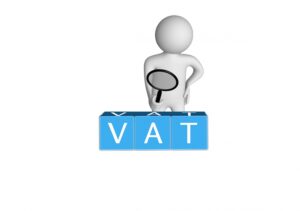When are VAT payments due?
Businesses submitting quarterly VAT returns are required to pay VAT due 1 month and 7 days following the end of the end of the VAT period. For example, a VAT period ending on 31 March will require payment of the VAT liability by the 7 May. However, if the business registered for paying by direct debit, payments are usually taken 3 days after VAT return deadline.
How does VAT work?
A business must register for VAT when its VAT taxable turnover exceeds the current £85,000 threshold on a rolling 12 monthly basis period or expects to exceed the threshold in a single 30 day period.
From the date of registration a business must then charge VAT on all standard and reduced rated goods and services supplied within the UK.
The business must submit VAT returns to HM Revenue & Customs normally on a monthly, quarterly or annual basis. These VAT returns summarise the VAT collected from sales and the VAT incurred on expenditure during the VAT period. If the VAT collected is more than the VAT incurred, then the difference is paid by the business to HM Revenue & Customs. If the VAT incurred is more, HM Revenue & Customs will refund the difference.
When is VAT applicable?
VAT is applicable on all standard rated and reduced rate goods and services supplied within the UK. Whether UK VAT is applicable depends on the place of supply for the goods or service. Individuals in the EU who are not registered for VAT in their own EU member state should be charged VAT as usual. Most supplies exported outside the European Union or sent to someone who’s registered for VAT in another EU member state can be zero rated.

Which VAT scheme to use?
The appropriate VAT scheme to use depends on each businesses circumstances and preferences. The main types of VAT accounting schemes are:
- Standard scheme – quarterly VAT submissions, VAT on income and expenditure based on invoice date. Must wait 6 months for VAT bad debt relief.
- Annual scheme – only requires 1 VAT return to be submitted each year, payments made in advance based on last VAT return submitted, may under/over pay towards VAT liability based on previous return.
- Flat rate scheme – paying a percentage of VAT inclusive turnover. The percentage applicable is determined by the industry the business is in. Aimed at small businesses. To join the scheme the turnover for the next 12 months must be estimated to be less than £150,000 (excluding VAT). Once on the scheme, a business can remain on the scheme until its VAT inclusive turnover exceeds £230,000. There are special rules for “Limited cost traders” aimed at reducing unintended profits from being on the scheme. Under this scheme VAT on expenditure cannot be reclaimed on costs unless it relates to capital items e.g. computers costing £2,000 or more (including VAT).
- Cash scheme – VAT on income and expenditure included on the VAT return based on payment date / receipt date, rather than the invoice date. Good for cash flow, only pay across VAT on income once actually received.
- Invoice scheme – VAT on income and expenditure included on the VAT return based on date of invoice. May end up paying over VAT on income before actually receiving payment for the invoice. May be able to reclaim VAT on expenditure before actually paying for the goods or service.
Who is exempt from VAT?
Examples of VAT exempt supplies include insurance, Financial Services, lottery games and medical treatments. However, a detailed list of exempt goods and services can be found on HM Revenue & Customs website https://www.gov.uk/guidance/rates-of-vat-on-different-goods-and-services
Author: Luke Thomas, Director, Plus Accounting
Any views or opinions represented in this blog are personal, belong solely to the blog owner and do not represent those of Plus Accounting. All content provided on this blog is for informational purposes only. The owner of this blog makes no representations as to the accuracy or completeness of any information on this site or found by following any link on this site.


